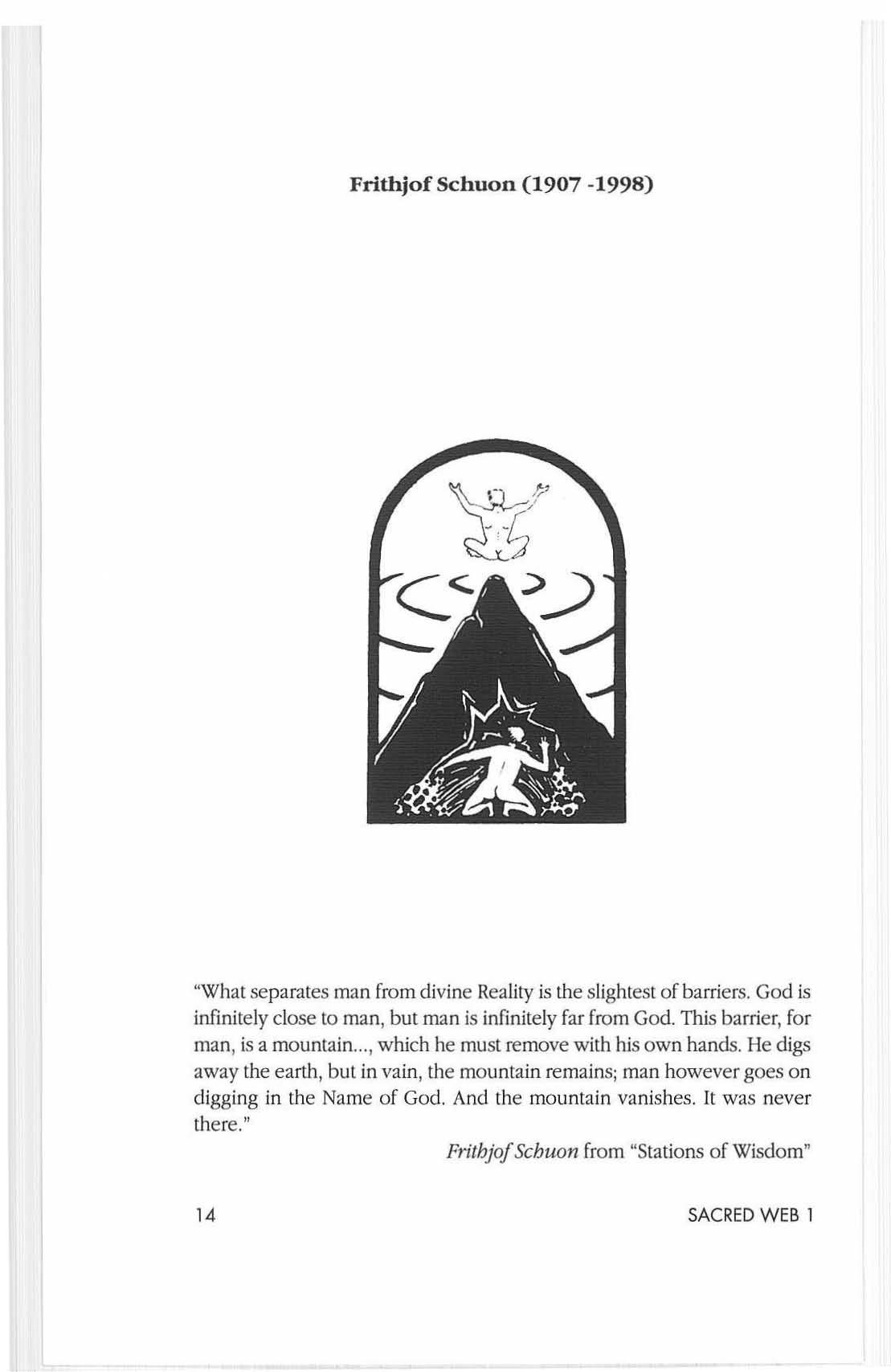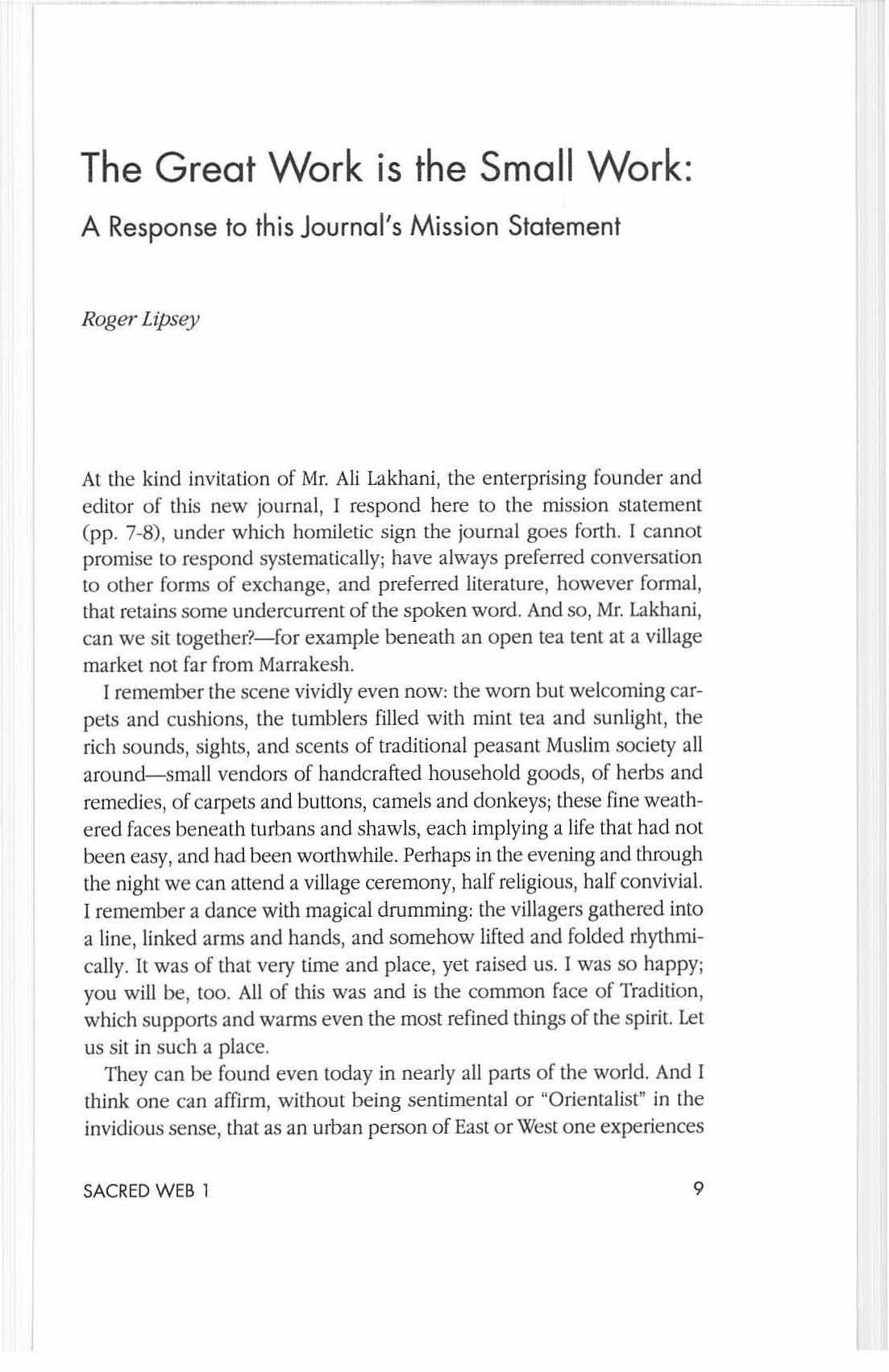
10 minute read
The Great Work is the Small Work: A Response to this Journal's Mission Statement
from Sacred Web 1
Roger Lipsey
At th e kind invitatio n o f Mr. Ali Lakhani, the enterprising founder and edito r of thi s new jo urnal , I respond here to the mi ss ion stat e ment (pp. 7- 8), un de r which h o miletic sign the journal goes forth. r ca nn o t promi se to respo nd syste maticall y; ha ve alway s preferred co nversat ion to o th er forms of exc hange , and p referred literature , however formal , tha t re tain s so me undercurrent of the spoken word. And so, Mr. Lakhani, c an we s it tog e th e r?-for example benea th an open te a tent at a village market not far from Marrakes h.
Advertisement
I remember the scene vividly even now: the worn but welcoming ca rpets and cushi ons, the tumblers filled with mint l ea and sunlight , the rich sounds, s ights, and sce nts of traditional pea sa nt Mu s lim soci ety all around-s mall vendo rs of handcrafted household goods, of herbs and of carpets and buttons, camels and donk eys; these fin e weathered face s b e neath turban s and shawls , each implying a life that had not been eas y, and had been worthwhile. Perhaps in U1e evening and through th e night we ca n att e nd a village ce remony, half religious, half conviv ial. I re memb e r a dance with magical drumming: the vi ll agers gath e red into a line, linked arms and hands , and somehow lifted and folded rhythmica lly. It w as of that very time and place , yet raised us. I was so happ y; you will be, too. All of this was and is the common fa ce o f Tradition , w hi c h s upp o rt s and warms eve n the most refined things of th e sp irit. Let us sit in such a pla ce.
They ca n be found e ven today in nearly all parts of th e world. And I think one can affirm , without being sentimen tal or "Orienta list" in th e invidious sense, that as an urban person of East or West one experiences in suc h sett ings both a deep sense o r well b eing and a stabb in g sense of loss, f o r thi s is not how one lives , nor is the thrust of the modern wo rld leading toward preservation of such things. On the contrary, such timeless environments are burning away , like the vast acreages recently reduced to ash in Indonesia , Borneo , Mexico. You have taken note of this tendency to loss in your mission state me nt.
If that is th e common face o f Tradil ion, s houldn ' t we also remember the uncommon face of il , the sc hools and tea ching/l ea rning circles in which doctr ine and practice a re pa ssed "from mouth to ear, " by sa ges who in th e ir turn s tudied with sages and so on, through the co rridors of time. Some at leas t of these lin eages lea d back to eras of Revelation or to great re novat ors by whom whole traditions were res to red to their original fres hn ess and s h arp c ut. This is a lso the realm of texts-I would willingly cap ita lize to Texts, for th e sc ripture, commentary, practice guides, reco rded myths, histories and tales, the seekers ' jou rn a ls and saints' biographi es th at make up th e library of Tradition are sac red to anyone wh o experiences the ache to be and to know , to unc o ver the Imperishabl e in the obvious fragility of our lives.
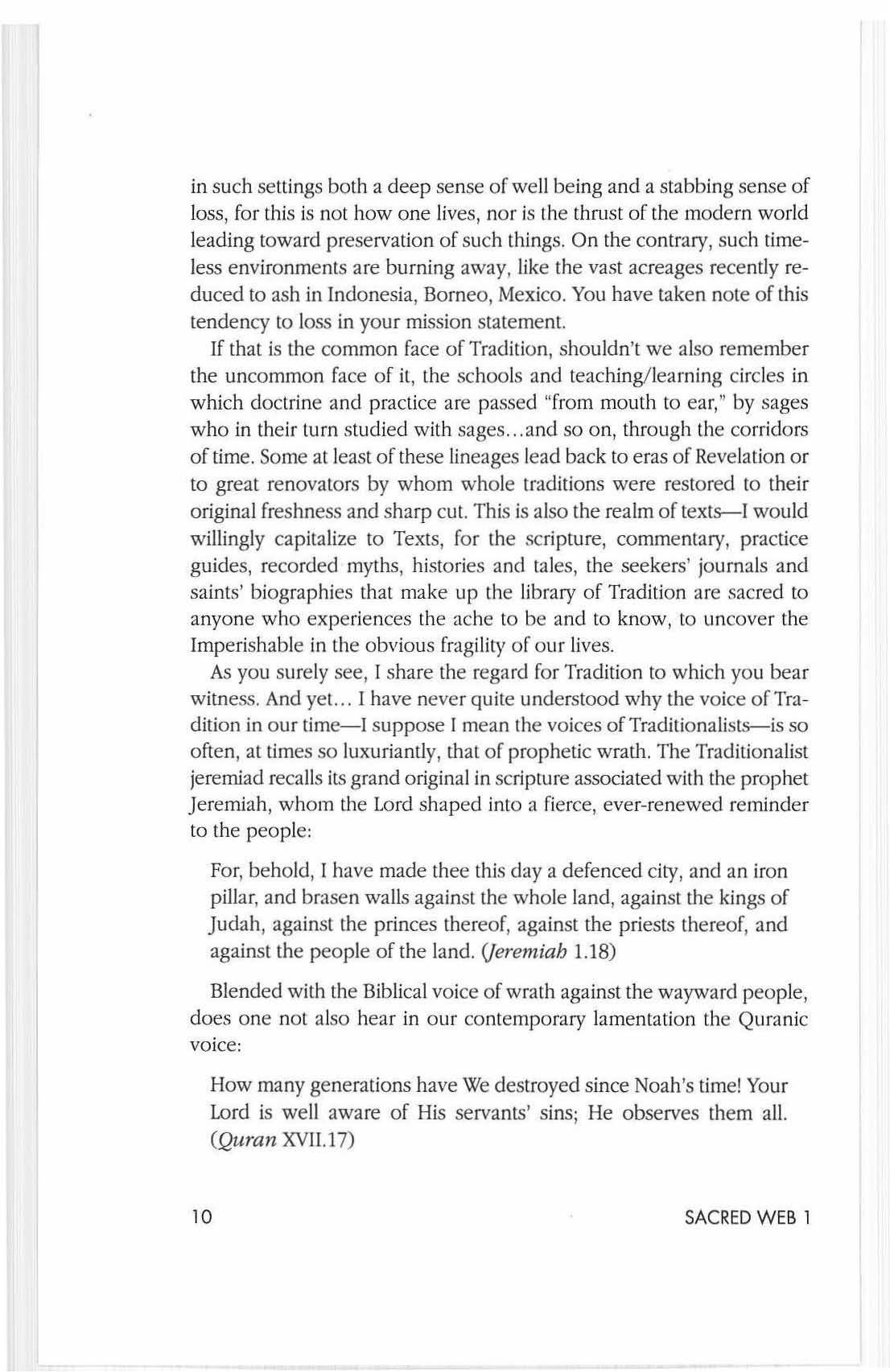
As yo u s ur e ly see, r s hare th e regard for Tradition to which you bear w it nes..<;. And ye t ... I have n eve r quite und e rstood why the vo ice ofTradition in our tim e- I su ppose I mean th e voices of Traditio nali s ts- is so often, at limes so lu xuriantly, tha t of prophetic wrath. The Traditionalist jeremiad re ca ll s its grand origina l in sc ripture associated with the prop het Jeremiah , whom th e Lord shaped into a fi e rc e, ever- renewed re minder to the people,
For, beho ld, I have made thee this day a defenced city, and an iron pillar, and brasen walls again st the whole land, again st the kings o f Judah , aga inst the princes the reo r, aga in st the priests th ereof, and against th e people of the land . fjeremiah 1.18)
Blended with the Biblical voice of wrath against the wayward people, does on e no t also hea r in our co nt em porary lamentation th e Quran ic voice:
How many generations have We d es troyed s in ce Noah's time! You r Lord is well aware of His serva n ts' s ins; He observes th e m a ll.
(Quran XV I1.17)
How best to understand th e "defenced city," the "iro n pillar" of 20'h_ ce ntury Traditionalism' It is fully voiced in the third paragraph of the mission s ta tement: " ... a wo rl d of in creasin g fragmentation and spiritual poverty; a world accultured by the hubris of science and the materialistic creed of economic expioilati o n , ... a world of promiscuity , consumerism, crime, corruption, bigotry, exploitation, disease, " and so on. One can say of this passage, I think justly , that it is to be understood as a summary of observat ions made in extenso in the writings of Rene Guonon, Ananda K. Coomaraswamy, Frithjof Schuon, Seyyed I-Iossein Nasf, and o th e r primary expo nents of the Traditional perspective. For many readers of this journal, their writings are magisterial illuminations, the greatest of which o ne will never forget; their thought and pulse enter one.
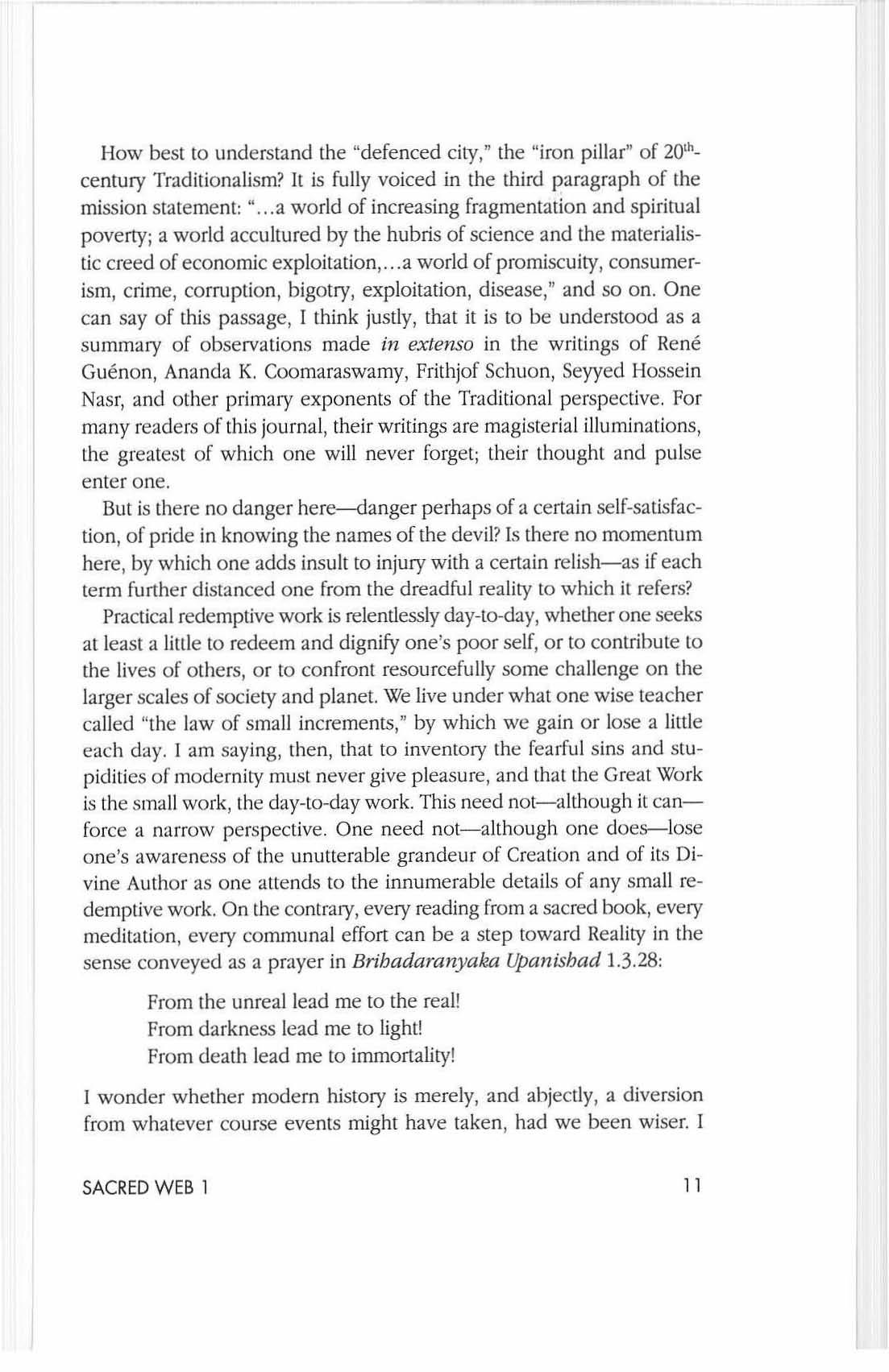
But is there no danger here--<langer perhaps of a certain self-satisfaction, of pride in knowing the names of the devil? Is there no momentum here , by which one adds insult to injury with a cer tain relish-as if each term further distanced one from the dreadful reality to which it refers?
Practical redemptive wo rk is relentlessly day-to-day , w he th er one seeks at least a littl e to redeem and dignify one 's poor self, or to co ntribute to the lives of othe rs, or to con front resourcefully some cha ll enge on th e larger scales of society and planet. We live under what one wi se tea c her ca lled "the law of sma ll increments, " by which we gain or Jose a littl e eac h day. I am saying, then, that to inventory th e fearful s in s and stupidities o f modernity must never give pleasure, and that the Great Work is the sma ll work, th e day-to-day work. This need not-a lthough it canforce a narrow perspective. One need not-although one doe,s-.lose one's awareness of th e unutterabl e grandeur of Creation and of its Divine Author as one altends to the innumerable details of any sma ll redemptive work. O n the contrary, every reading from a sac red book, every meditation, every communal effort can be a step toward Reality in the sense conveyed as a prayer in Brihadaranyaka Upanishad 1.3.28:
From the unreal lead me to th e real!
From darkness lead me to light!
From death lead me to immortality!
I wonder w hether modern history is merely, and ahjec tl y, a d ivers ion from whatever course events might have taken , had we been wiser. I SACRED wonder whether scie nce and technology are essentially si nful , in that they ca nn Ol bur d ivert u s from what th e mi ss ion statement properly ca lls a sense of th e sacred. In its second paragraph , the sta teme nt see ks to deal fairl y with the contempo rary wo rld by remembering some of o ur achievements-medical scie nce, for example, and s p ace tr ave l w h ich has g iven us ou r first good look at our p lanetary home. But those acknowledgments are drained by a s hort and te ll ing ph rase to the effec t tha t these thin gs provoke an ev il : they "almost make us believe that we are gods capab le of any th ing. " Is th is rea ll y so? Admitte dly , the phrase "maste rs of the universe" has been co in ed, by wits in o u r own c ulture , to describe young financial wizards who ha ve made quick fortunes and fee l on top of the world. But abou t that very com muni ty, a witty novel was written a nd wid ely read , Tom Wolfe's Bon/ireo/the Vanities , w h ic h rath er puts the m in th eir p lace. I do no t th ink that m any o f u s const rue this dangerous world as good proof t h a t "ye sh all be as gods" (Genesis 3.5) or that we are anything lik e gods. Too much AID S, too mu c h ca nce r, too mu c h war, too much poverty, too many frightening eco logica l porte nts , too much socia l d is location, too much violence and noise in th e popu la r arts, too man y se lf-serving po lit ica l leaders. Thi s is my own li st.
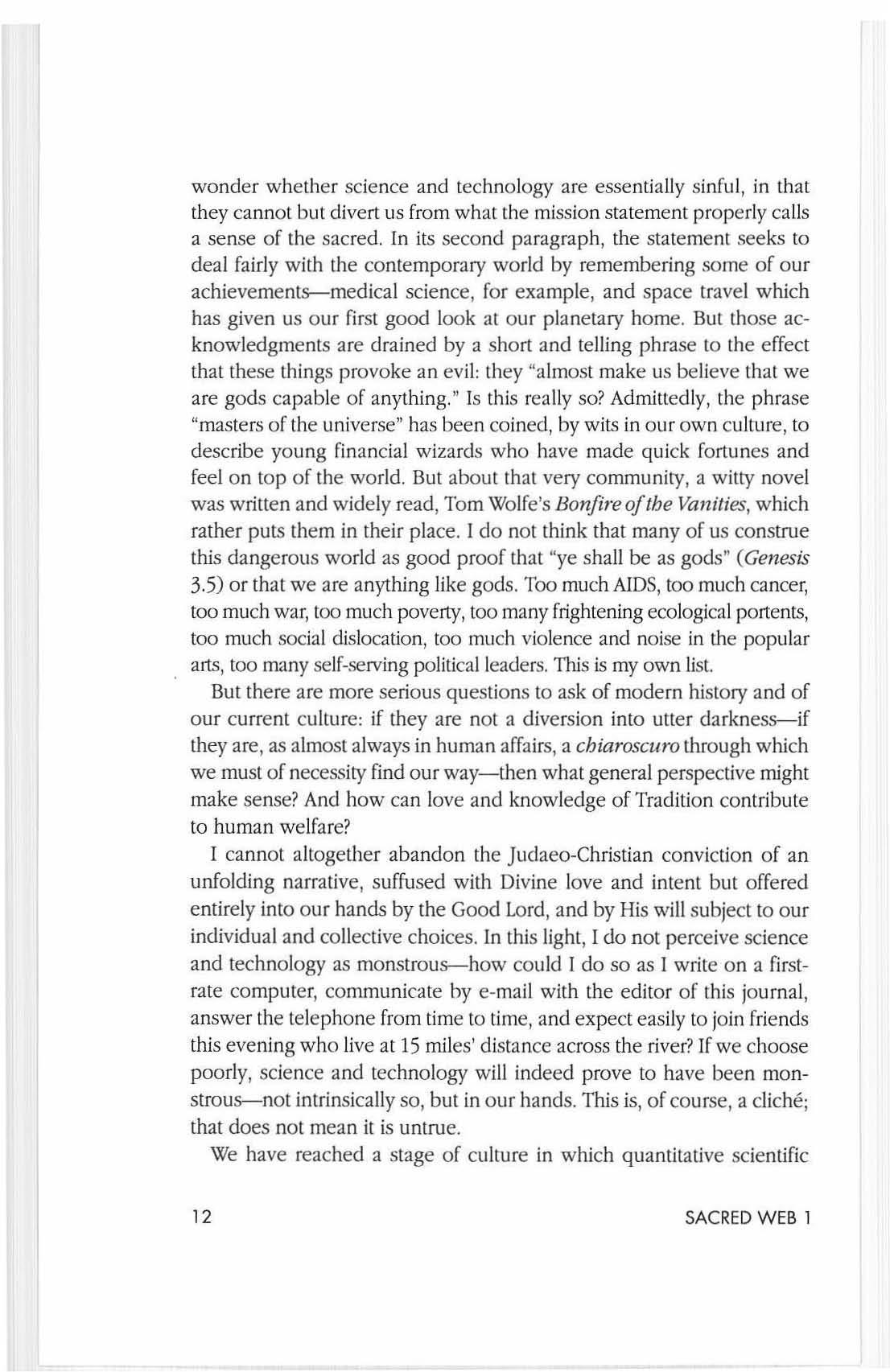
But th ere a re more se ri o us questions to as k of modern history and o f our c u rren t cu llUre: i f they are not a diversion into utt er da rkness-if the y are, as a lmost a lways in human affairs, a chiaroscuro throug h which we must of n eces..o:;; ity find our way-t h e n what genera l pe rspec tive might make se n se? And h ow can love and knowledge of Tradition co ntribute to human welfare?
I can n o t a ltogether aband o n the Jud aeo-Ch ristian conviction o f an unfold ing na rrati ve, suffu sed w it h Divine love and intent but offe re d entire ly into our hands by the Good Lord, and b y His will s ubj ec l to ou r ind ividual and co ll ective choices. In thi s li gh t , I do not perceive scie n ce and tec hn o logy as monstrous- h ow cou ld I do so as I write on a firstrate comp ut e r, com muni cate hy e-mail w ith the editor of thi s jou rnal , answer the te lep h one from tim e to t ime, and e xpect eas il y to join friends this eve ning who live at 15 miles' distance across the river? If we c hoose poor ly, science and technology w ill indee d p rove to ha ve bee n mons trou s-not intrinsically so, but In ou r hands. This is, of course, a cl ic he; that does no t mea n it is untrue
We have reache d a s ta ge of cu lture in whic h qua ntit at ive scientific observation has at last ca ught up with Pasca l's premon itory ver ti go as he co nt e mplate d the "two infinitudes, " t he infinitely s ma ll and th e infinit ely g rea t. This stag e is, lik e all prior stages of c ulture , a fi e ld of choice in which mu ch if not all depends on th e w isdom of ou r choices. What , th en, is th e role of Tradition? Each of us who cares w ill perhap s answer this question a liul e differently. The mission stat eme nt of this promising new jou rnal speaks of th e need "to id entify Traditional 'first principl es' and th ei r applicat ion to the co ntingent of modernity, and to exp ose th e fa lse premises of modernity ... ." Thi s is surely sensib le. But do it with love, by which I mean do it pati ently , with an eye not only to th e Truth but 10 peop le here and now , and n ot on ly to "p eo pl e h e re and n ow" but to thi s very p e rson whom you address and whom you might al so feel and kn ow. Do not permit th e awesome beauty o f sc ripture, and eve n of reli gious practice, to lure you away from co nt act with thi s thinking, feeling flesh that we are.
So mew here in his writings, Coomaraswa my reca ll ed the title of Oliver Go ldsmith 's late 18m-ce ntury play , She SlOOps 10 Conque r He c ited it , as you ca n imag in e, not as a matter of theater history but to mak e a larger point. The s toop into the real tex ture of life that he adv ised remains binding on all who h ave been to u ched and cha nged by our enco unt e rs with Tradition. That "descent, " as you well know , ushers us int o a realm of sac red paradox where the way up is th e way down (Heracle itus), where th e fulfillment of th e highest is consummated through its con ta ct and poss ibl e union with o rdinary things.
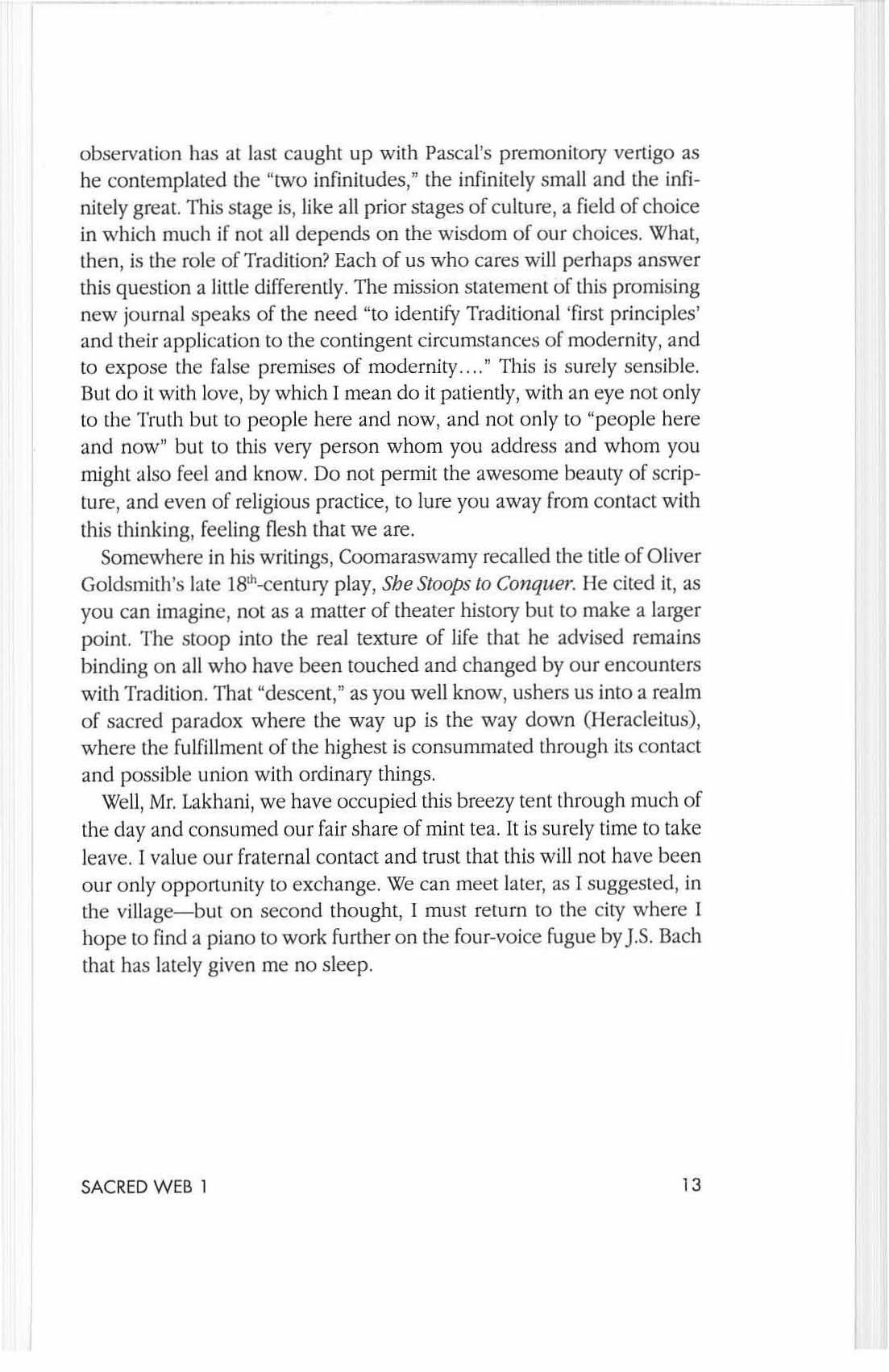
Well, Mr. Lakhani, we have occupied this breezy tent through mu ch of th e day and co ns um e d ou r fair share of mint tea. It is s ur e ly tim e to ta ke leave. I value our fra ternal co ntact and tru st that thi s wi ll not have been ou r only o ppo rtunity to exc hange. We can me et later, as I suggested, in th e vill age-but on second th ought , I mu st return to the city where I ho p e to find a pia no to wo rk further o n th e four-voice fu g u e by).S. Bach that has lately give n me no sleep.
SACRED WEB 1
"W hat separates man from divine Reality is the s light est of barriers. God is infinitely close to man , but man is infinitely far from God. This barrier, for man , is a m ounta in , which he must remove w ith his own hands He digs away the earth, but in vain, the mountain remains; man however goes on d igging in the Name of God. And the mountain vanis h es. It was never there."
Frith)o! Schuon from "S tations of Wisdom "
